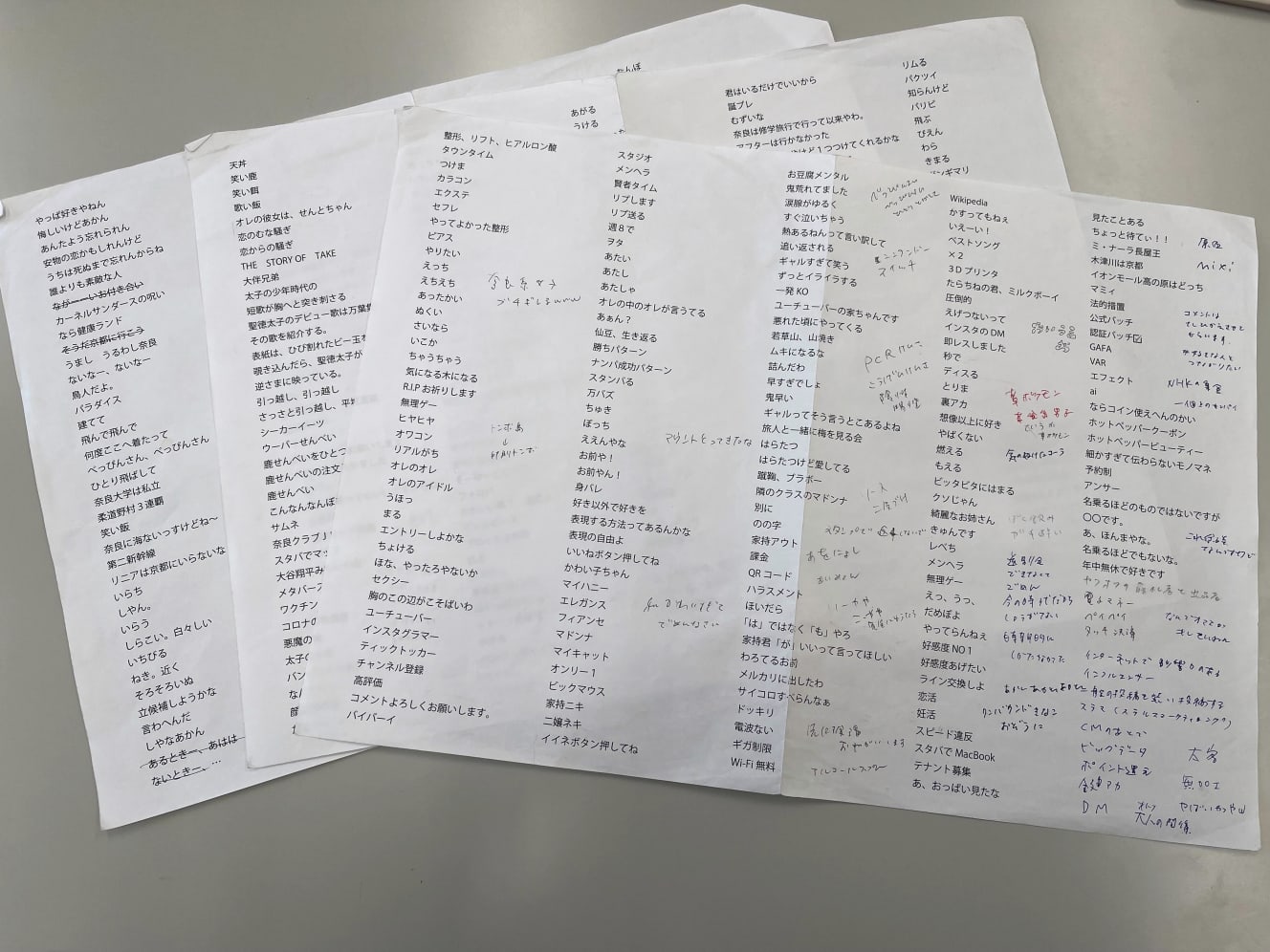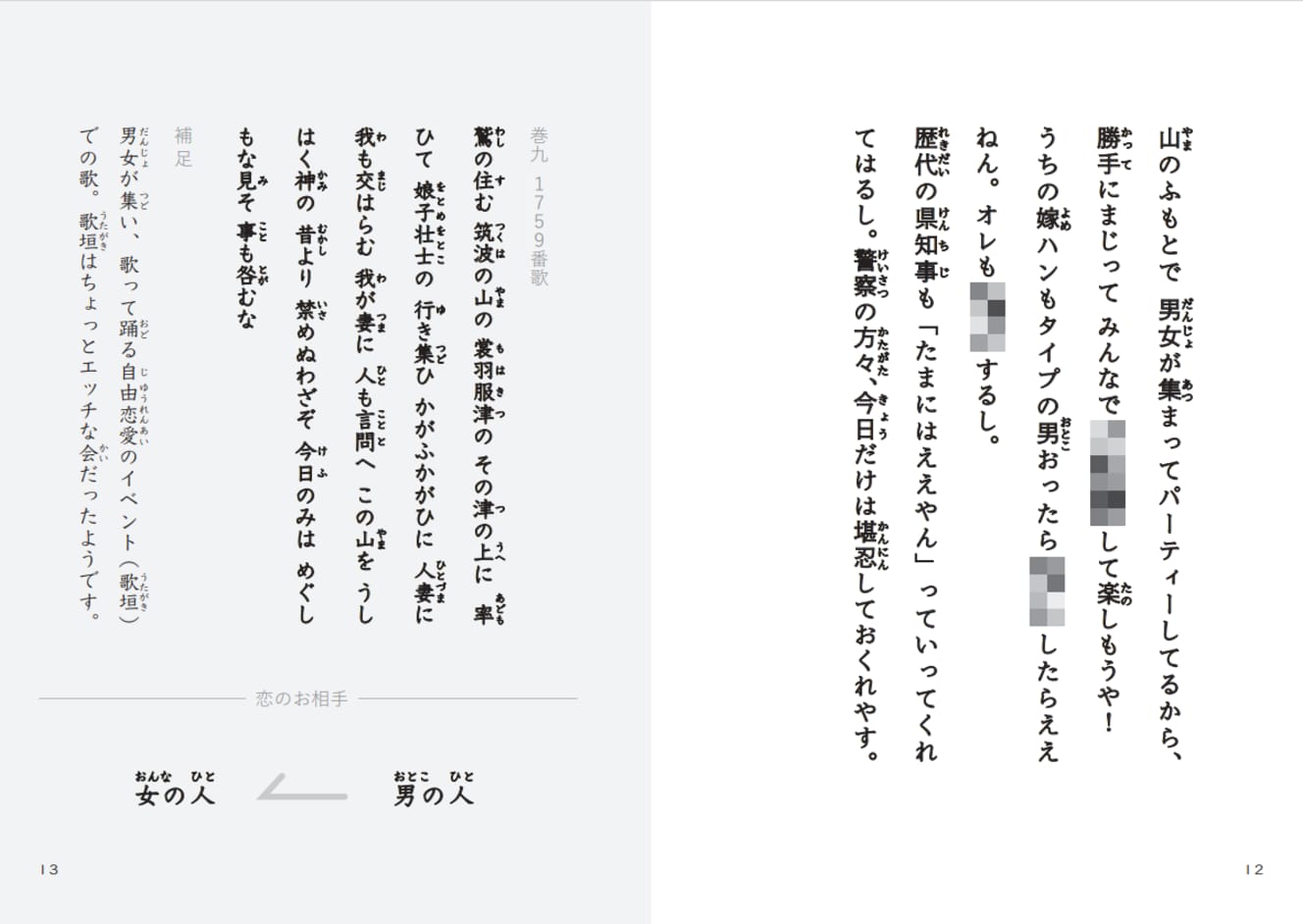Adultery and plunder…FRIDAY in the Nara Period! 200,000 copies of the long-running gal language “Reiwa Man’yoshu,” the complete story of the Reiwa version.
I don’t care anymore. Why do I keep following people who don’t even follow me?
Let me make it clear that this is not a tweet that the author could not suppress her overflowing feelings and misdropped on a social networking service. It is a 2038 translation of a well-known poem from the Nara-era waka anthology “Manyoshu.
Incidentally, the original text is as follows
“Yoshiueyashi, kun no kita wo kara mashinu kun wo kotosemu ni itohazu gareha ai hitsuitsumu” (The Anthology of Myriad Leaves, Vol. 11, No. 2378).
The original text reads as follows.
It is a poem in which the poet says to a lover who shows no interest in him, “I don’t care about you any more.
The book “Reiwa Words: Nara Dialect Translation of the Man’yoshu” (hereafter, “Reiwa Man’yoshu”) is a collection of poems from the Nara period translated in the Reiwa style. More than a year after its release, the book has sold more than 200,000 copies, with sales reaching 200 million yen. This is extremely unusual in a time when the publishing industry is in the midst of a recession. Moreover, it is Ryo Sasaki, president of Manyosha, who has achieved this feat single-handedly (all statements in parentheses are his own).
Let us explain why the book has been such a long-running hit, and how he has gone beyond the boundaries of a so-called “fun translation book,” paying close attention to every detail.
Manyosha was born from a 100,000 yen donation
The book was published by Ryo Sasaki, president of Manyosha Co. The company was established in August 2020 with 100,000 yen in special support funds provided by the COVID-19 crisis. The 200,000 copies sold in this day and age is a significant figure, but the company is a one-man operation that handles the entire process of editing the manuscript, binding, delivering, and selling the book. He does not use an intermediary publishing company, and all deliveries to bookstores are done by Mr. Sasaki.
In the beginning, we made 500 copies to give away as wedding gifts. Eventually, the book became a hot topic on social networking sites, and we began to sell 5,000 copies. to 50,000 copies. to 50,000 copies to 50,000 copies. For about two months, the phone rang every five minutes with orders. I was getting a call every five minutes for about two months. It was a very exciting time for us. (Mr. Sasaki).
The company wanted to name the company after Reiwa, and so it was named “Manyosha,” after the 32 poems of plum blossoms in the Manyoshu, the oldest anthology of Japanese poetry, from which the original name of the company was derived.
Excellent translation brings it back to life Digital Tattoo from 1,300 Years Ago
The Manyoshu, a collection of waka poems compiled over the Nara period (710-794), contains many poems about love at that time. The Man’yoshu also contains glimpses of love affairs that are similar to today’s entertainment news, such as a poem about a royal family member marrying a government official and another about adultery. In the sense that this book is a “FRIDAY 1,300 years ago,” it is a book that makes the naked love stories of that time accessible to the public.
How is the Nara-era Manyoshu translated in the “Reiwa Manyoshu”? Let us look at some example sentences.
A child washing morning greens in this river, you and I both can have our own children.
This is known as a song in which a man with a child proposes marriage to a woman who has lost her husband, and the word asana (Chinese cabbage) refers to the so-called female genitalia. It is said to be a kind of pick-up line, “Since you and I both have nice things, why don’t we have a baby?
Based on this, the Reiwa Manyoshu translates it as follows
Hey, honey! Hey, honey there, how about making a banana shake with my banana and your milk?
If translated as “let’s have sex,” it would be too direct. The female organ is compared to a Chinese cabbage in the sentence, and the male organ is described as a banana. Since Chinese cabbage x banana is not a good combination, the Chinese cabbage is translated as “your milk. The combination of “my banana” and “your milk” is a seductive phrase for making a banana shake, and the beginning of the phrase “Hey, honey there” is formed. By daring not to use the words “male genitalia” and “sex,” the author also embodies the “modesty” characteristic of the Nara period.
The first written Japanese characters were used in the Nara period. The first time the Japanese language was used as a written language, the word “sex” was used, It was in the Manyoshu that the love stories of the time were written down. The Manyoshu was the first written form of Japanese, and the love stories of the time were written in the Man’yoshu. It has been 1300 years since then. It has been 1300 years. Even after 1,300 years, everyone still uses hiragana to express their love and feelings through e-mail and SNS. Even now, 1,300 years later, everyone still uses hiragana to express their love affairs and thoughts through e-mail and SNS. I feel myself in the Man’yoshu, the cornerstone of Japanese language culture. I respect Manyoshu, which is the foundation of Japanese language culture, and that is why I do not want to make a simple translation. translation. I didn’t want to make a cheap translation. That’s why I didn’t want to make a simple translation. I wanted to translate the poem into Japanese.
In translating the text, Mr. Sasaki says that he studied the modern language as well as the understanding of waka poetry. Normally, when translating old documents, the translation is done in the order of “from the original text to the Japanese translation, and then to the current language. In this book, however, he has used a reverse translation method, applying the current language to the waka poem to make it more enjoyable for the reader.
He read numerous gyaru magazines, wrote down words that were popular on social networking services, and translated them by comparing the Reiwa words with the Man’yoshu. The book contains words mainly used by young people, such as “spadari,” “kusa ga gairu,” and “agemisawa,” as well as modern satirical words such as “big 0-tar,” which means “the grass withers.
If the meaning of modern words is given too much priority, the meaning of the waka poem will be ruined, and if it is too faithful to the waka poem, it will not be interesting. It is out of respect for the Man’yoshu that the poems were polished dozens of times per sentence.


The design of the magazine is in line with the Reiwa era, and does not feel forced. and “I want to do it. books that do not feel forced.
The attention to books is also evident in the style of writing. The sentences in “Reiwa Manyoshu” are devoid of punctuation, which he says was inspired by the Weekly Shonen Jump magazine (published by Shueisha), which he loves to read. The standards for undertones have also been adjusted so that they do not go beyond the realm of shonen manga.
He also paid close attention to details such as the font for kanji and hiragana characters, line spacing, and line breaks. He says that he originally graduated from an art college and used to make illustrated catalogs, and that his experience in bookbinding was put to good use during the bookbinding process.
A year after its release, Mr. Sasaki says that he continues to receive inquiries from the media and bookstores. He looks back on the hit that led up to today.
The “not-so-pushy” part of the book was I think that may have been a big hit. I think the fact that I am not too brazen may have been a big hit. Ordinary books are categorized into one or two chapters and are produced in the usual way. If a publisher is involved, the book will be categorized as “recommended by 00! “Read this and you’ll understand!” etc. but this book has none of them. The content of the book is also “ Manyoshu sings of the frustration of wanting to see each other but not being able to “ The concept of the book is, “ Reiwa “” COVID-19 crisis “ and the period called coincided well with and the time may have coincided with it.”
Currently, volumes 1 and 2 of the book are on sale, and he hopes to reach volume 50 in the future. I started my business with 100,000 yen in benefits from the government for the COVID-19 crisis, and my goal is to pay back 100 million yen in taxes to the government,” he concluded his dream.





Interview and text by: FM Nakanishi